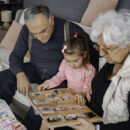Understanding the Seven Stages of Vascular Dementia
Dementia is a term that encompasses several cognitive disorders that lead to memory loss and diminished cognitive abilities. One such type is vascular dementia, which arises due to reduced blood flow to the brain. This can result from events like strokes, leading to a gradual decline in cognitive functions.

How Prevalent and Serious Is Vascular Dementia in the U.S.?
Vascular dementia is the second most common form of dementia after Alzheimer’s disease. In the U.S., it’s estimated that vascular dementia affects approximately 1 in 20 Americans over the age of 65, translating to millions of individuals. As the U.S. population continues to age, the number of people affected by this condition is expected to rise, underscoring its significance as a public health concern.
The impact of vascular dementia is profound. Beyond memory loss, the condition can disrupt every facet of an individual’s life, from daily tasks to interpersonal relationships. As the disease advances, many affected individuals require constant care, placing both emotional and financial burdens on families.
Risk factors such as high blood pressure, diabetes, and heart disease are closely linked to the onset of vascular dementia. Strokes, whether minor or major, can precipitate the development of this condition. Unlike other dementia types, vascular dementia’s progression can be abrupt, with symptoms intensifying markedly after each subsequent stroke.
Recognizing the progression of this condition is vital for families and caregivers. Early diagnosis and intervention can help manage symptoms, enhance quality of life, and potentially slow the disease’s progression.
The Seven Stages of Vascular Dementia
1. Normal Cognitive Behavior (Pre-dementia):
At this initial stage, there’s no discernible change in behavior or cognitive abilities. However, microscopic changes in the brain have already commenced.
Individuals continue their daily tasks as usual, with no noticeable memory lapses or cognitive difficulties.
2. Very Mild Cognitive Decline (Pre-dementia):
This stage is often mistaken for age-related forgetfulness. It’s characterized by occasional memory lapses and slight difficulty in problem-solving.
Individuals might misplace household items, forget names of acquaintances, or struggle with finding the right words during conversations.
3. Mild Cognitive Decline (Pre-dementia):
Here, the symptoms become more noticeable. There’s a consistent pattern of forgetfulness and a decrease in cognitive abilities. It’s during this phase that many realize that the forgetfulness isn’t just age-related.
Individuals may forget appointments, lose track of days, or frequently misplace items. They might also struggle with planning or organizing tasks.
4. Moderate Cognitive Decline:
This is a crucial stage where individuals might forget significant details or events. Cognitive challenges become more pronounced.
Individuals might forget to manage their finances, like paying bills. They might also struggle to recall recent events, conversations, or personal details like their address.
5. Moderately Severe Cognitive Decline:
Daily activities become challenging. There’s a significant decline in memory and cognitive functions.
Individuals might need assistance with tasks like dressing, bathing, or cooking. They might also forget significant details like their address, phone number, or even familiar routes.
6. Severe Cognitive Decline:
Independence becomes a challenge. There’s a pronounced difficulty in recalling familiar faces, names, or events.
Symptoms like incontinence emerge. Individuals might also exhibit behavioral changes, including aggression or agitation. They might wander or get lost in familiar places. A memory care community may be the most appropriate environment for an older adult experiencing this stage.
7. Very Severe Cognitive Decline:
This is the final stage where individuals require constant care. Cognitive functions are severely impaired.
Individuals might struggle with basic tasks like eating, communicating, or walking. They may lose the ability to recognize loved ones, have difficulty swallowing, and might become bedridden.
Vascular Dementia and Mobility
Reduced blood flow to the brain can impact mobility. Balance, coordination, and even paralysis on one side of the body can become challenges. Physical therapy and rehabilitation can aid in improving mobility. Furthermore, maintaining a healthy lifestyle, including a balanced diet and regular exercise, can reduce the risk of further complications.
Lifestyle Factors and Prevention
Several lifestyle factors can increase the risk of developing vascular dementia. These include smoking, excessive alcohol consumption, lack of exercise, obesity, and an unhealthy diet. While there’s no surefire way to prevent dementia, adopting a healthier lifestyle can reduce risks associated with brain vessel damage.
Vascular Dementia vs. Alzheimer’s Disease
It’s essential to understand that vascular dementia and Alzheimer’s are distinct conditions. While both can exhibit similar symptoms, their causes differ. Vascular dementia results from reduced blood flow to the brain, whereas Alzheimer’s is linked to protein build-ups in the brain.
The Way Forward
Understanding vascular dementia is more than just recognizing its stages; it’s about comprehending the profound impact it has on individuals and their families. Each person’s journey with this condition is unique, marked by challenges, resilience, and moments of clarity amidst the fog of memory loss.
For families, witnessing a loved one navigate the maze of dementia can be heart-wrenching. The individual who once shared stories, offered wisdom, and created memories might now struggle with the basics of daily life. However, amidst these challenges lie opportunities for deep connection, understanding, and love. It’s in the gentle reminders, the shared laughter over a forgotten joke, or the simple act of holding hands, that the essence of the person shines through.
The more we learn about dementia care, the more we realize the importance of community and support. It’s not just about medical treatments or therapies; it’s about creating an environment where individuals feel valued, understood, and cared for. It’s about recognizing that beneath the veil of forgetfulness lies a person with a rich history, dreams, and emotions.
At Koelsch Communities, we’ve witnessed countless stories of resilience and love. We’ve seen families come together, forging deeper bonds as they support their loved ones. We’ve also observed the transformative power of compassionate care, where individuals, even in advanced stages, find moments of joy and connection.
While vascular dementia presents undeniable challenges, it also offers opportunities for growth, understanding, and deep human connection. With the right support, resources, and a community that cares, individuals and their families can navigate this journey with dignity, grace, and hope.
Understanding vascular dementia’s progression is crucial for families and caregivers. It allows for better preparation and ensures that the affected individuals receive the care and support they need. Remember, every individual’s experience of dementia is unique. With the right care, understanding, and support, it’s possible to navigate these challenges with grace and dignity.
Koelsch Communities: Pioneers in Dementia Care
At Koelsch Communities, we’ve been providing Mom-Approved Care since 1958. Our mission is to create happiness by offering the finest living experiences anywhere. We believe in crafting environments where your loved ones can thrive, treating each resident – our ladies and gentlemen – with the respect they deserve. If you or a loved one is navigating the challenges of dementia, reach out to us. Our expertise and compassionate care can make a difference.
Disclaimer: This article is for informational purposes only and does not constitute medical, legal, or financial advice. It’s recommended to consult with a medical, legal, or financial professional for your specific circumstances.









